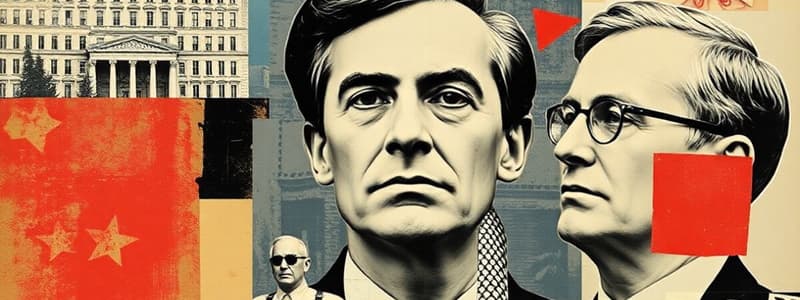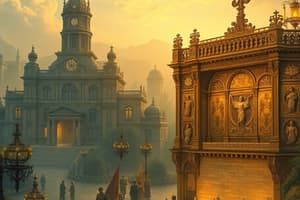Podcast
Questions and Answers
What is the primary focus of Schmitt's realism?
What is the primary focus of Schmitt's realism?
- The development of harmonious political order
- The promotion of universal human rights
- The chaotic and contingent aspects of political life (correct)
- The establishment of abstract legal principles
How does Schmitt define the concept of 'the political'?
How does Schmitt define the concept of 'the political'?
- A universal understanding of state power
- The distinction between friend and enemy (correct)
- The economic dynamics of social classes
- The promotion of individual rights
What aspect of liberal thought does Schmitt criticize?
What aspect of liberal thought does Schmitt criticize?
- Its recognition of the state’s importance
- Its emphasis on individualism (correct)
- Its focus on community identity
- Its commitment to conflict resolution
What does Schmitt argue about human reason in politics?
What does Schmitt argue about human reason in politics?
According to Schmitt, what is a critical condition of the state’s role?
According to Schmitt, what is a critical condition of the state’s role?
What is the main implication of Schmitt's view on sovereignty?
What is the main implication of Schmitt's view on sovereignty?
What does Schmitt believe about liberal democratic institutions?
What does Schmitt believe about liberal democratic institutions?
What aspect does Schmitt prioritize over individual rights?
What aspect does Schmitt prioritize over individual rights?
What is the central concept of Schmitt's understanding regarding state power?
What is the central concept of Schmitt's understanding regarding state power?
What fundamental distinction defines Schmitt's concept of the political?
What fundamental distinction defines Schmitt's concept of the political?
Which of the following best describes the implications of Schmitt's thought?
Which of the following best describes the implications of Schmitt's thought?
What does the state of exception highlight in terms of legal norms?
What does the state of exception highlight in terms of legal norms?
How does Schmitt relate politics to theological concepts?
How does Schmitt relate politics to theological concepts?
What role does conflict play in Schmitt's view of the political?
What role does conflict play in Schmitt's view of the political?
What is often debated regarding exceptional measures under the state of exception?
What is often debated regarding exceptional measures under the state of exception?
Which aspect of Schmitt's ideas is frequently criticized?
Which aspect of Schmitt's ideas is frequently criticized?
Flashcards
Schmitt's Realism
Schmitt's Realism
Schmitt's realism focuses on the concrete, contingent, and chaotic aspects of political life, contrasting with abstract ideals. He emphasizes the importance of power, strategy, and political struggle.
Schmitt's Particularism
Schmitt's Particularism
Schmitt's particularism emphasizes specific communities, cultures, and traditions, challenging universalizing ambitions of liberalism. The 'political' is defined by the friend-enemy distinction.
Friend-Enemy Distinction
Friend-Enemy Distinction
Schmitt's key concept, highlighting the difference between a community's own members ('friend') and those outside it ('enemy'), determining the specific identity of the 'we'.
Schmitt's Critique of Liberalism
Schmitt's Critique of Liberalism
Signup and view all the flashcards
State of Exception
State of Exception
Signup and view all the flashcards
Sovereignty
Sovereignty
Signup and view all the flashcards
Schmitt's Focus on Politics
Schmitt's Focus on Politics
Signup and view all the flashcards
How does Schmitt differ from liberals?
How does Schmitt differ from liberals?
Signup and view all the flashcards
Schmitt's 'Political'
Schmitt's 'Political'
Signup and view all the flashcards
Political Decision-Maker
Political Decision-Maker
Signup and view all the flashcards
Political Theology
Political Theology
Signup and view all the flashcards
Friend vs. Enemy Distinction
Friend vs. Enemy Distinction
Signup and view all the flashcards
What is the significance of Schmitt's 'State of Exception'?
What is the significance of Schmitt's 'State of Exception'?
Signup and view all the flashcards
Study Notes
Introduction to Schmitt's Realism and Particularism
- Schmitt's work emphasizes realism and particularism, contrasting sharply with liberal, universalist approaches.
- His realism examines the concrete, contingent, and often chaotic realities of political life, differing from abstract ideals of law and morality.
- Particularism highlights the significance of specific communities, cultures, and traditions, challenging universalizing liberal thought.
Realism in Schmitt's Thought
- Schmitt's realism rests on the limits of human reason and the inherent conflict within political life.
- He disputes the existence of a harmonious political order based solely on rationality.
- Political life is inherently characterized by conflict and decision-making, particularly during crises.
- Schmitt's work underscores the importance of power, strategy, and the dynamics of political struggle.
Particularism in Schmitt’s Political Philosophy
- Schmitt's particularism is expressed through his concept of the "political."
- The "political" is defined by the distinction between "friend" and "enemy," reflecting a particular community's identity.
- This "friend/enemy" dynamic is rooted in specific historical and cultural contexts.
- This concept contrasts with universal, abstract notions of the state in liberal thought.
- Unlike liberal thinkers focused on individual rights, Schmitt prioritizes the collectivity and well-being of the political community.
Critique of Liberalism
- Schmitt criticizes liberalism for imposing universal categories and principles that fail to account for the specific nature of political life.
- He challenges the liberal reliance on abstract conceptions of law and morality, arguing these fail to understand the concrete circumstances of political action.
- Schmitt's analysis critiques liberal democratic institutions' ineffectiveness during crises and the fragility of universalizing political solutions.
Schmitt on the State and Sovereignty
- Schmitt highlights the state's role in maintaining order and security within its specific community.
- Sovereignty is the state's ability to decide on the state of exception, suspending ordinary laws.
- This distinguishes itself from purely rule-based law in liberal democracies.
- The state of exception is crucial; it's a moment of absolute state power overriding rules.
Schmitt's Concept of the "Political"
- Schmitt's "political" distinguishes itself from other human realms (economic, social, religious).
- It is defined by the fundamental "friend/enemy" distinction, shaping a political community's identity and survival.
- Conflict and decision-making are essential elements in understanding political life.
Implications of Schmitt's Thought
- Schmitt's ideas are influential but often controversial.
- His emphasis on realism and particularism resonates with those who feel liberal values are insufficient in challenging situations.
- His focus on the state of exception and the political decision-maker has been adopted by various political actors.
- Recognizing the role of the political in any society is crucial despite inherent authoritarian connotations.
Schmitt and the "State of Exception"
- The state of exception suspends ordinary laws to allow decisive action during critical moments.
- The legitimacy of such actions is often debated and scrutinized concerning appropriateness, fairness, and legitimacy.
- It highlights the limitations of legal and constitutional norms.
Schmitt's "Political Theology"
- Schmitt examines interconnections between political and theological concepts.
- He argues that religious concepts (sovereignty, authority) are important in establishing political order.
- This perspective complicates traditional secular/religious divisions in political thought.
Studying That Suits You
Use AI to generate personalized quizzes and flashcards to suit your learning preferences.




